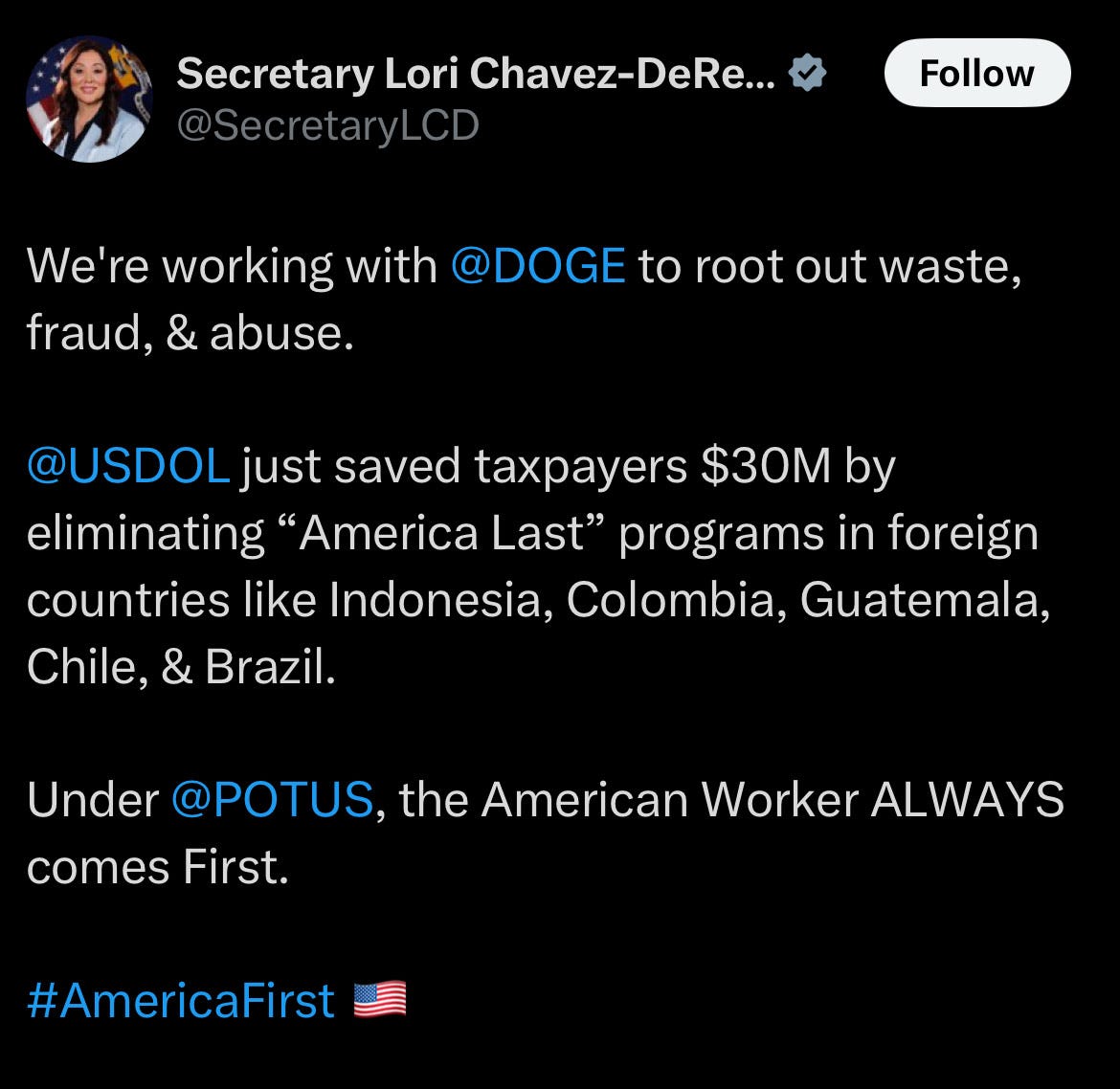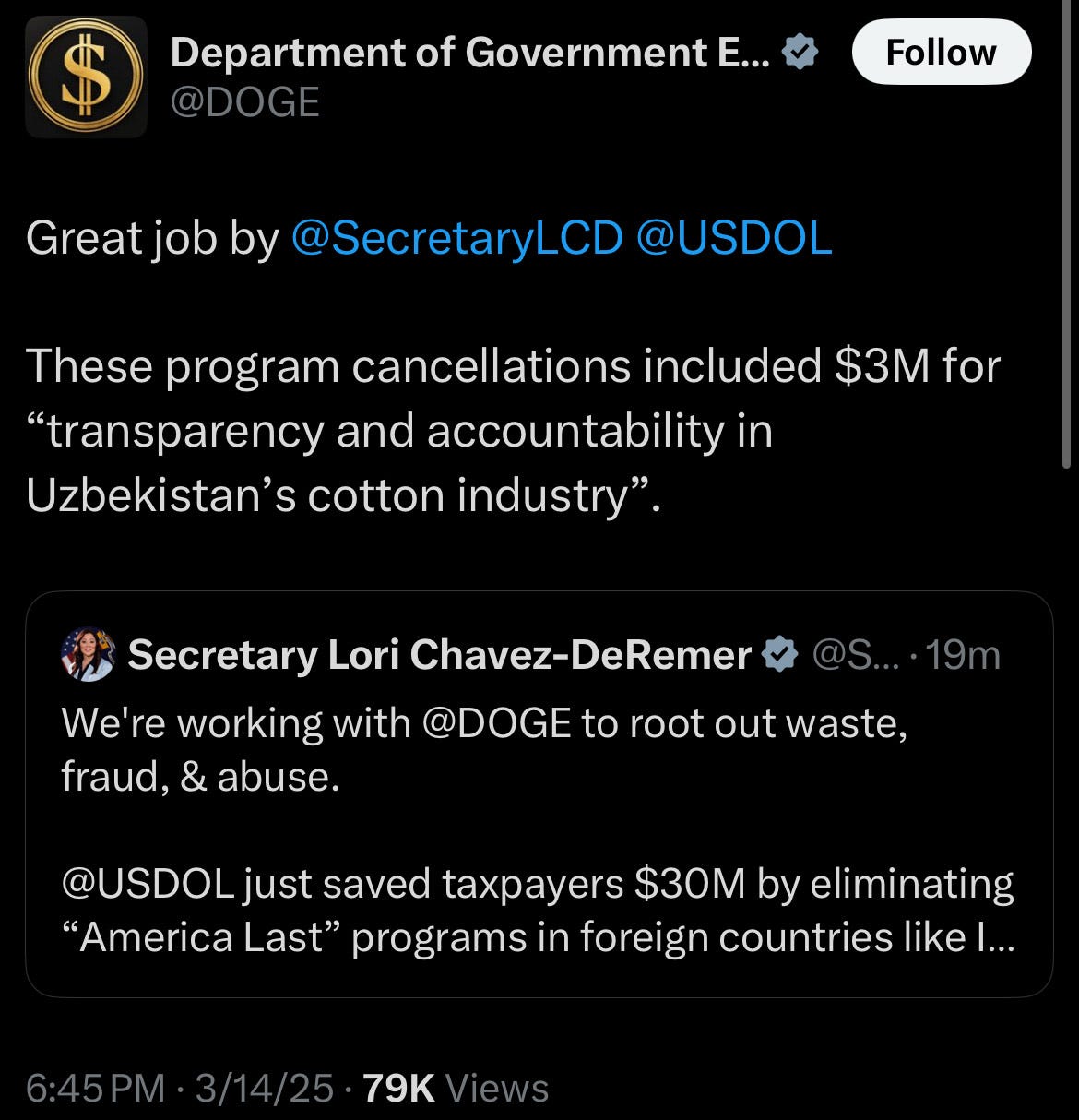Senate Republicans wanted to stop child labor. DOGE just cut cash that does that.
DOGE apparently claimed its first DOL grants. Here's what they did and why that's bad for fighting child labor and positioning American goods in a trade war.
I had noted the past two weeks that DOGE hadn’t claimed any Department of Labor grant funding on its official kill list. The money is not posted on the kill list yet,1 but according to a couple official tweets late last week, DOGE finally claimed its first grants at DOL.2
Before we get to the tweets, I want to take you back to Labor Secretary Lori Chavez-DeRemer’s confirmation hearing. As you probably have heard, the United States has seen a sharp increase in child labor the past few years. It was a big concern of the Biden-Harris Administration DOL under former Secretary Marty Walsh and Acting Secretary Julie Su. It certainly was a contrast to me during the administration because some Republican-led states had loosened restrictions on children and teenagers getting jobs, purportedly to deal with labor shortages.
Because of the issue’s ties to immigration, there was, and remains, a line of Republican attacks on former President Biden’s reaction to the child labor surge.3 This line of attacks resurfaced during the Chavez-DeRemer hearing with a couple of features I found notable:
These senators’ telling of child labor does not seem to involve any active decision-making by American employers—or at least it doesn’t linger upon the fact that American-based employers hired these children and/or benefited from their employment.
Of Republicans who raised the issue during the hearing, only Sen. Josh Hawley of Missouri mentioned a specific employer, Tyson Foods, before better matching the tone of the discussion by having an aide hold up charts that could spell doom for Joe Biden in the 2024 election.
Per Republican senators’ telling, when I was in those meetings with senior leaders at DOL where child labor was a key concern, when I was in the room with them where they gave speeches about it, when I put together materials myself on addressing child labor and labor trafficking through the investment of workforce dollars, DOL was not in fact working on the issue of child labor and has been apathetic about this issue, at best, until the new Trump Administration.4
This obviously couldn’t be fact checked by pointing to an interview with CBS News.
Or by pointing to a budget hearing where Su asked Congress for more money to fight child labor.5
Or to a news story about a nationwide effort to combat child labor noting hundreds of DOL investigations. Or this law firm blog post or this one about how to fend off “aggressive” DOL child labor investigations. Or this report to the Senate.
To give you some specifics on this rhetoric, here is Sen. Ashley Moody from Florida:6
Many [migrant children] were forced into labor trafficking working many hours a day, even undercutting American wages . . . I find it appalling that more people were not speaking out about this and certainly unacceptable that we had an administration that was not talking about this every single day.
And Jim Banks of Indiana:
The Labor Department is responsible for combating human trafficking and forced labor under the Fair Labor Standards Act, and the Biden administration completely ignored these kids that were brought here illegally and being exploited.
Here is some of what Chavez-DeRemer said in response during the hearing:
As I mentioned, what has happened over the last four years has been horrendous. It is not something the United States [should] stand for. And again, it is not a political issue. This is [about] protecting children.
I know how important it is to protect, well, first of all, children who have no fault of their own are being exploited. . . . Again, as I mentioned, it's abhorrent that we would ever in this country choose to do so. So we will make sure that our workers are safe. We'll make sure that our children are safe, and then we will make sure that we are heading in the right direction to protect our businesses and protect our workers[.]
[I]t's an important remit under the Department of Labor, as you know, to protect and not exploit all workers, but certainly child labor should not be accepted by anybody in America.
So when the DOGE grant news came over last Friday from the Twitter account of Chavez-DeRemer:
I immediately assumed this was part of DOL’s international work, which is very heavy on fighting child labor. Then, DOGE tweeted about the cuts themselves:
After about two seconds of using a high-tech information gathering and processing tool called “Google,” I found DOL information on the Uzbek grant, which, yes, was meant to help ward off child labor. Emphasis mine.
For decades after the fall of the Soviet Union, the government of Uzbekistan maintained a legacy of strong, centralized control of the sector. Farmers and seasonal workers, including children, were forced to plant and pick cotton. . . . [P]olicy reform and government efforts to promote public awareness of forced labor prohibitions, identify violations, and penalize offenders, have markedly reduced forced labor and child labor and renewed international interest in sourcing and investing in Uzbek cotton. These new opportunities for economic growth come with market demand for cotton produced under decent working conditions. To achieve this, employers will need to demonstrate their compliance with good labor practices and work to amplify the voices of workers.7
The other grants involved aren’t so clear because DOGE didn’t provide those identifying details, which is why I have been closely monitoring DOGE’s kill list (and holding off on posting) to see if more information surfaced. But taking Chavez-DeRemer’s tweet as accurate and the digital trail as accurate too, the evidence indicates that some of the rest of those DOGE-cut grants went toward fighting child labor.
For example, the only open project I found for Chile involved stopping child labor. Much of the Brazilian work also seems to be about fighting child labor, too—three out of five of the open projects in the country, specifically.
Even if the cuts aren’t to child labor grants, DOL records indicate they could be projects fighting related problems like human trafficking and forced labor. Senate Republicans also aired out these problems as concerns in attacks on Biden about child labor.
Given the Uzbek cut, and the rhetoric in the Senate, I don’t think it’s unfair to ask DOGE and DOL to disclose (and why it hasn’t already disclosed) whether those other cuts were to child labor-related projects too. Or to ask why DOGE bragged about the Uzbek project, specifically,8 given the Senate concerns about child labor and Chavez-DeRemer’s rhetoric in the confirmation hearing.9
As I discuss below, I think it’s fair to assume these cuts presage more DOGE cuts to DOL’s international labor work. Cuts to child labor grants projects the Secretary called “America Last”—plus any cuts to the staff who put together things like reports on the use of child labor and identifying goods produced through child labor—don’t seem consistent with Chavez-DeRemer’s assertion that “child labor should not be accepted by anybody in America.”
Behind the paywall.
Why DOL spends money on fighting child labor and forced labor overseas.
Why cutting child labor and other international labor dollars is generally not the best idea when, for example, you’re starting a trade war.
My takeaways for all workforce grantees after these cuts.







